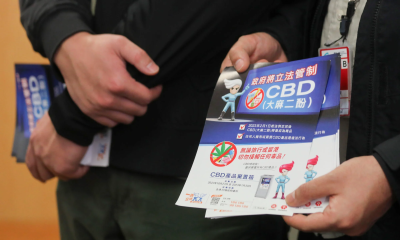Brazilian physician Ailane Araújo, founder and president of the Development Center in Cannabinoid and Integrative Medicine (NDMCI), says that the Resolution No. 2.324/2022, published by the Federal Council of Medicine (CFM) last week, is “unconstitutional” and “violates the professional freedom of the doctor”, accusing the body of “flagrant illegality”. According to statements by the health professional to Cannareporter, the measure represents “a real setback on the national scene, impacting the lives of countless patients who benefit from the therapeutic use of cannabis for the most diverse pathologies”. A pioneer in the prescription of medical cannabis in Brazil, Ailane Araújo also warns that the resolution is “restrictive, contradictory and does not promote progress”.
The Federal Council of Medicine (CFM) published, on the 14th of October, the Resolution No. 2.324/2022, which restricts doctors to prescribe cannabidiol only for some cases of epilepsy, prohibiting the prescription for other diseases, such as depression, anxiety, chronic pain, Alzheimer's, Parkinson's, among others. In addition, the measure prohibits the use of other actives derived from cannabis sativa other than cannabidiol, “limiting various types of medical treatments that are currently carried out”, says Ailane Araújo, who is also Director of the Brazilian Center for Reference in Cannabinoid Medicine ( CBRMC).
The doctor, postgraduate in Pediatrics, Nutrology, Positive Psychology and Coaching, with international certification, also told Cannareporter that CFM Resolution No. Ailane Araújo warns that the measure “drastically impacts the sector”, which has been struggling to reach international levels, where medicinal cannabis-based therapies are treated as something effective, and “several research points to the benefits of treatment in a broad spectrum of pathologies.
“Political and ideological, but not scientific, motivations”
Speaker at several scientific medical congresses and events on medicinal cannabis and integrative medicine, Ailane Araújo goes further and states that “measures like this will not intimidate us or take away our courage to change” this scenario in Brazil. “We want to promote advances, whether through studies, research or assistance, spreading knowledge and minimizing prejudice, to offer quality of life to the greatest number of people. The ban on the dissemination of knowledge is like trying to silence doctors who work in this area. The limitations posed by this resolution indicate political and ideological motivations, but not scientific ones. This measure is incapable, incongruous and incoherent, even because Anvisa itself authorizes the import, production and marketing of cannabis-derived products for various pathologies”.
Ailane believes that “the Court will overturn this resolution due to the flagrant illegality, in addition to the lack of scientific basis. The sector is already mobilizing for this and we hope to have news as soon as possible”.
CFM resolution “is unconstitutional”
like the lawyers Aquiles Castro and Emílio Figueiredo, Ailane warns that Resolution No. 2.324/2022 “is unconstitutional”, explaining that “art. 5th, Inc. XIII, of the Federal Constitution, says that the exercise of any work, trade or profession is free. Thus, this resolution clearly violates the professional freedom of the physician”. Still, art. 5th, Inc. XIV, of the Federal Constitution, says that access to information is guaranteed to all. Thus, “the CFM Resolution violates this constitutional provision, by limiting access to available and scientific information regarding medical treatments with products derived from cannabis sativa”.
According to Chapter I, inc. VII, of the Code of Medical Ethics, “the doctor may not, under any circumstances or under any pretext, renounce his professional freedom, nor allow any restrictions or impositions that may impair the efficiency and correctness of his work”. Ailane points out that the resolution “also harms the physician’s own autonomy provided for in the Code of Medical Ethics, as it limits their activities, preventing the professional’s freedom to choose the most appropriate treatment for the clinical case, with the patient and his family. ”.
On the other hand, the doctor says that “an institution with legal personality governed by public law, such as the Federal Council of Medicine (CFM), can only do what the law allows. In this case, the attributions of the CFM are defined by Law nº 3.268/57, among which are: supervising medical ethics, judging and disciplining the medical profession, aiming at the perfect ethical act and the good concept of the profession. It is important to note that the aforementioned law does not include the CFM's attribution to limit or prohibit medical prescription. Even cannabis-based products are marketed in Brazil with authorization from Anvisa, which has legal authority to do so. Therefore, it is not the responsibility of the CFM to edit the rules that regulate medical prescriptions”, he warns.
Ailane also draws attention to the fact that the medical act is regulated by Law No. which he shall act with the utmost zeal, to the best of his professional ability and without discrimination of any kind”.











































Congratulations on the article! Dr Ailane is completely right! 👏🏻